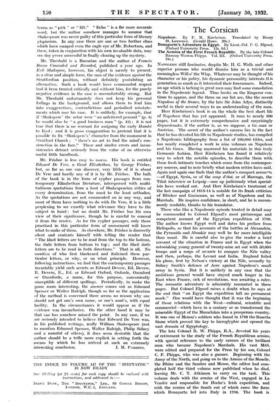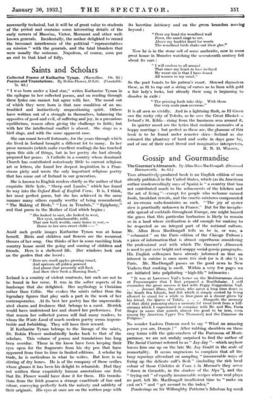The Corsican
Napoleon. By F. M. Kireheisen. Translated by Henry St. Lawrence. (Gerald Howe. 30s.)
Bonaparte's Adventure In Egypt. By Lieut.-Col. P. Cl. Elgood. (Oxford University Press. Its. 6d.)
NAPOLEON still fascinates, despite Mr. H. G. Wells and other superior persons who would dismiss him as a trivial and meaningless Will o' the Wisp. Whatever may be thought of his character or his policy, his dynamic personality interests.tlis generation as much as it interested their forerunners. Indeed, an age which is lacking in great men may find some consolation in the Napoleonic legend. Thus books on the Emperor con- tinue to appear, and the three on our list arc, like the recent Napoleon of the Snows, by the late Sir John Adye, distinctly useful in their several ways to an understanding of the man.
Herr Kireheisen's book is on the whole the best short life of Napoleon that has yet appeared. It runs to nearly 800 pages, but it is extremely comprehensive and surprisingly dispassionate, if the author is, as we suppose, a Ge.man or Austrian. The secret of the author's success lies in the fact that he has devoted his life to Napoleonic studies, has compiled a Napoleonic bibliography from a list of 100,000 titles, and has nearly completed a work in nine volumes on Napoleon and his times. Having mastered his materials in this truly Germanic fashion, Herr Kircheisen has found it relatively easy to select the notable episodes, to describe them with these fresh. intimate touches which come from the contempor- ary sources, and to note briefly what modern critics have said. Again and again one finds that the author's compact accounts --of Egypt, Syria, or of the coup d'elat, or of Marengo, the Tilsit interview or Leipzig—sum up judiciously what special- ists have worked out. And Hen* Kireheisen's treatment of the last campaign of 1813-14 is notable for its frank criticism of Bliicher and Gneisenau, as well as of Napoleon and his Marshals. He inspires confidence, in short, and he is uncom- monly readable, thanks to his translator.
Those who like a Napoleonic episode treated in detail may be commended to Colonel Elgood's most picturesque and competent account of the Egyptian expedition of 1798. The author knows Egypt well and dates Isis preface from Heliopolis, so that his accounts of the battles at Alexandria, the Pyramids and Aboukir may well be far more intelligible than usual. He is careful also to give the reader a brief account of the situation in France and in Egypt when the astonishing young general of twenty-nine set out with 30,000 troops and a corps of savants to conquer the Nile valley and then, perhaps, the Levant and India. England foiled his plans, first by Nelson's victory at the Nile, secondly by Sidney Smith's defence of Acre against Napoleon's small army in Syria. But it is unlikely in any case that the ambitious general would have stayed much longer in the East when France, sick of revolutions, was awaiting a ruler. The romantic adventure is admirably recounted in these pages. But Colonel Elgood raises a doubt when he says at the end that " on Egypt the expedition left no permanent mark.sl One would have thought that it was the beginning of those relations with the West—cultural, scientific and commercial—which have in a century or so transformed the miserable Egypt of the Mamelukes into a prosperous country.
It was one of Menou's soldiers who found in 1798 the Rosetta. Stone which proved the key to hieroglyphic and opened the vast domain of Egyptology.
The late Colonel R. W. Phipps, R.A., devoted his years of retirement to the study of the French Republican armies, with special reference to the early careers of the brilliant
men who became Napoleon's Marshals. His vast MSS., were edited and prepared for the Press by -his son, Colonel
C. F. Phipps,. who was also a gunner. Beginning with the Army of the North, and going on to the Armies of the Moselle, the Rhine and the Sambre and Meuse, the editor had com- pleted half the third volume. now published when he died, leaving Mr. C. T. Atkinson to carry on the task. This volume deals with the armies of the West, engaged in La Vendee and responsible for Hoche's Irish expedition, and with the armies of the South out of which came the force which Bonaparte led into Italy in 1796. The book is necessarily technical, but it will be of great value to students of the period and contains some interesting details of the early careers of Massena, Victor, Marmont and other well- known generals. Incidentally, the author delighted to record the incessant interference of the political " representatives on mission " with the generals, and the fatal blunders that were usually the outcome. Napoleon, of course, soon put an end to that kind of folly.





































 Previous page
Previous page